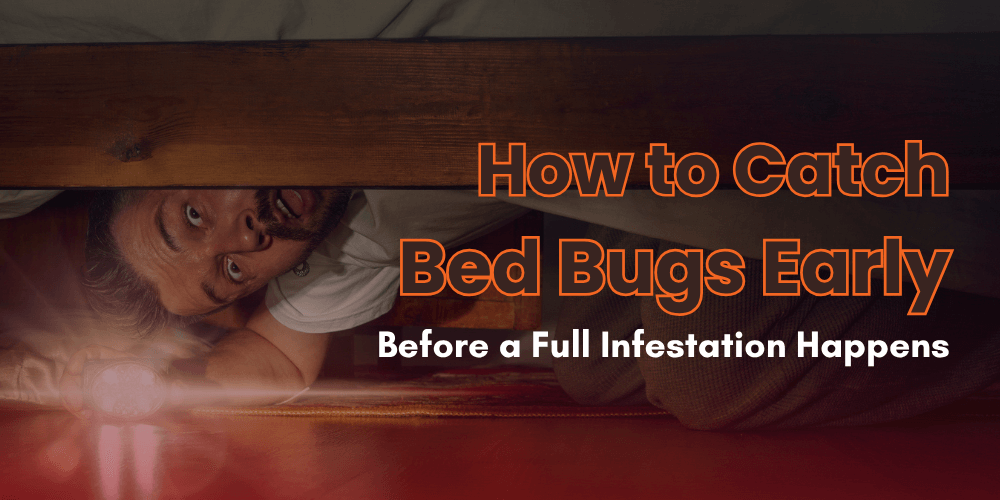How to Catch Bed Bugs Early Before a Full Infestation Happens

Catching bed bugs early can save you time, stress, and money. Many homeowners fail to act quickly because they mistake early signs of bed bugs for something else. Unfortunately, the longer you wait, the more these pests multiply and spread. You must understand the following to stop the problem before it becomes overwhelming.
Why Early Detection Matters
You don’t need to wait for a full-blown infestation before taking action. Waiting only worsens the situation. Bed bugs reproduce quickly, and the damage they cause can multiply overnight. Beyond discomfort, the financial cost of waiting adds up fast. To understand the urgency of spotting the early signs of bed bugs, consider the following:
1. How quickly bed bugs multiply:
-
A female can lay 200–500 eggs in her lifetime.
-
Eggs hatch in just 6–10 days under warm conditions
-
In 6 weeks, a few bugs can turn into hundreds
-
A new generation appears every 3–4 weeks if left untreated
-
Early signs of bed bugs often go unnoticed until the population explodes
2. The financial impact of waiting too long:
-
Treatment costs rise significantly with large infestations
-
You may need to discard furniture and bedding
-
The longer you wait, the more rooms are affected
-
Early detection reduces both extermination time and costs
Visible Signs of a Bed Bug Problem
If you’re concerned about bed bugs, your first defense is learning what to look for. These pests leave behind subtle but identifiable evidence. Don’t rely on bites alone; check your living space regularly. Pay attention to the following:
1. Stains on sheets and mattress seams:
-
Rust-colored or dark spots may be fecal matter
-
Blood stains from crushed bugs may appear on linens
-
Examine your mattress's borders and seams carefully.
-
Check pillowcases and fitted sheets regularly
-
Early signs of bed bugs often include minor stains in sleeping areas
2. Tiny shells, eggs, or blood smears:
-
Molted skins from growing nymphs appear tan and papery
-
Eggs look like tiny grains of rice, usually clustered in hiding spots
-
Blood smears may show up where you rest at night
-
Shells and eggs often hide in crevices or under mattress tags
-
These signs are typically the first physical evidence of infestation
Familiar Places to Find Early Bed Bug Evidence
Bed bugs don’t roam far from their host. They prefer tight, dark spaces close to where you sleep or rest. Even if your sheets are clean, these insects could be hiding nearby. To check the most likely places for early signs of bed bugs, inspect the following:
1. Bedroom furniture and cracks in walls:
-
Inspect nightstands and bed frames, especially joints and drawers
-
Cracks in walls, wood trim, and baseboards offer great hiding spots
-
Take a flashlight and look behind headboards or picture frames
-
Don’t forget to check electrical outlets and wall-mounted light fixtures
-
Bed bugs often hide early signs in or near your bed’s structure.
2. Upholstery and carpet corners:
-
Sofa cushions and seams can harbor early infestations
-
Lift rugs and check along the edges of carpeted areas
-
Recliners and other plush furniture are often ideal nesting grounds
-
Use a credit card to scrape along seams where bugs may wedge themselves.
Less-Obvious Indicators to Watch For
Not all early signs of bed bugs involve spotting the insects themselves. Sometimes, you need to rely on other clues. If you notice skin issues or unusual odors, these could signal a problem. Stay alert for the following:
1. A musty odor in closed-off spaces:
-
Bed bugs produce a subtle, musty smell with a sweet undertone
-
Odor becomes noticeable in infested rooms with limited airflow
-
Closets, storage bins, and drawers may retain this smell
-
If the scent lingers even after cleaning, investigate further
-
Early signs of bed bugs often include strange, persistent smells
2. Unexplained bites or allergic reactions:
-
Bites are usually small, red, and appear in clusters or lines
-
The itching may be intense and get worse overnight
-
Some individuals develop rashes or swelling
-
Not everyone reacts the same, so don’t rely on bites alone
-
Early signs of bed bugs may show up on your skin before you see the bugs
What to Do If You Spot a Sign
It's half the fight to identify bed bugs early. Acting fast helps prevent the infestation from spreading. DIY methods often fail because bed bugs are excellent hiders. Once you identify potential signs, do the following:
1. Scheduling a free inspection:
-
For a comprehensive assessment, contact a certified pest control business.
-
Many professionals offer free inspections to confirm the presence
-
Experts use trained eyes and tools like bed bug-sniffing dogs
-
Don't delay if you even slightly suspect activity
-
Professionals should always confirm early signs of bed bugs
2. Preparing for professional treatment:
-
Declutter the area to give exterminators better access
-
Launder all bedding, curtains, and clothes in hot water
-
Vacuum carpets and furniture thoroughly and dispose of the bag
-
Remove pets, plants, and perishables from treatment zones
The Truth About Early Bed Bug Detection
You don’t need to wait for a severe infestation before taking action. The earlier you notice signs, the easier and less expensive the treatment becomes. From stains to musty odors and bite marks, there are plenty of early warning signs if you know where to look. Catching these issues early is critical to maintaining a healthy and comfortable home. Stay proactive, stay informed, and always respond quickly when you see the early signs of bed bugs.
- Art
- Causes
- Crafts
- Dance
- Drinks
- Film
- Fitness
- Food
- الألعاب
- Gardening
- Health
- الرئيسية
- Literature
- Music
- Networking
- أخرى
- Party
- Religion
- Shopping
- Sports
- Theater
- Wellness
